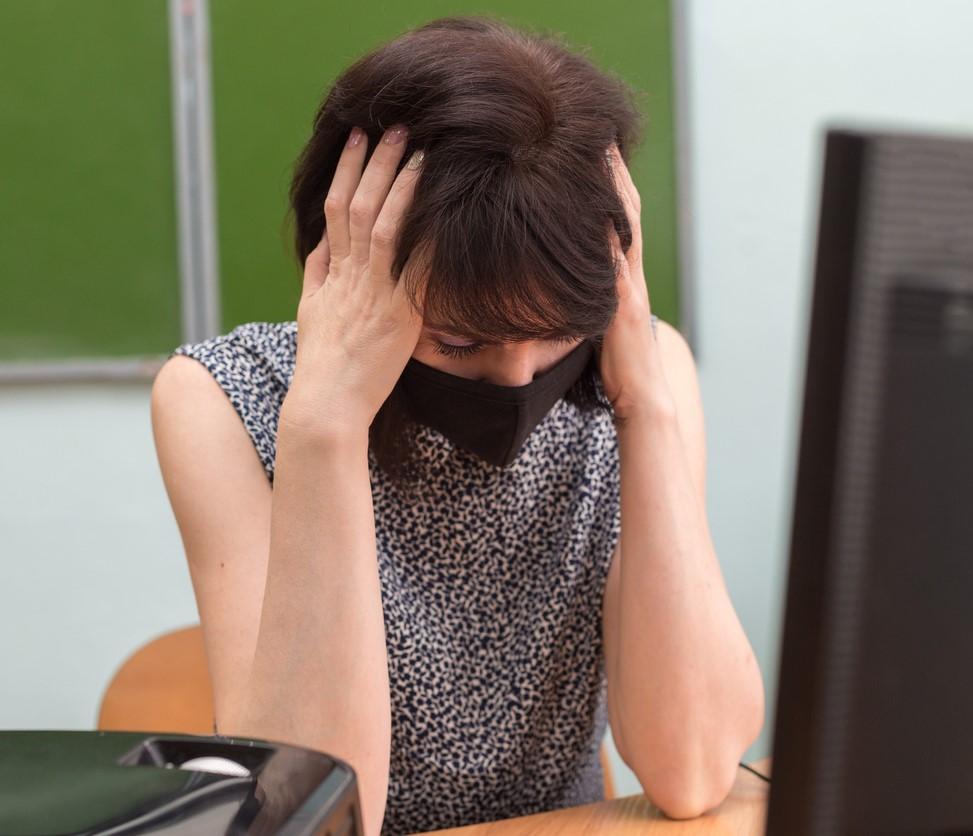The COVID-19 pandemic extracted mental health tolls from both teachers and young teens, with the former—remote instructors in particular—experiencing more anxiety than other workers, and the latter reporting depression owing to financial stress, according to two new US studies.
Teachers at 40% more risk than health workers
In the first study, published yesterday in Educational Researcher, James Madison and Johns Hopkins university researchers evaluated mental health among randomly selected Facebook users responding to the daily online US COVID-19 Trends and Impact Survey. The researchers parsed data from nearly 3 million adult respondents—including 130,000 teachers—from Sep 8, 2020, to Mar 28, 2021.
Teachers were at 40% higher risk of reporting anxiety within the previous 7 days than were healthcare workers, 20% more likely than office workers, and 30% more likely than workers in other occupations, such as military, farming, and legal professions. Teachers with a remote role were 60% more likely to report feeling isolated than their in-person counterparts, and female teachers had 70% higher odds of anxiety than their male peers.
Compared with teachers, healthcare, office, and other workers were significantly less likely to report anxiety (odds ratios [ORs], 0.70, 0.81, and 0.78, respectively). Likewise, healthcare workers had slightly lower odds of reporting depression (OR, 0.95) and a sense of isolation (OR, 0.96) than teachers. Office and other workers, however, were significantly more likely than teachers to say they felt isolated (ORs, 1.20 and 1.10, respectively).
Teachers instructing students remotely were at significantly more risk of depression (OR, 1.12) and isolation (OR, 1.56) than those with in-person roles. Across all professions, women were 90% more likely to report anxiety, 40% more likely to have depression, and 20% more likely to say they felt isolated.
Navigating uncertainty, evolving roles
"Even before the pandemic, teacher well-being was a major concern for school leaders," lead author Joseph Kush, PhD, of James Madison University, said in an American Educational Research Association news release.
He said the team was surprised that teachers had higher rates of anxiety than healthcare workers. "We would have guessed healthcare workers battling COVID-19 on the front lines during a public health crisis would display the most anxiety," Kush said.
"Although our study didn't examine the reasons behind teachers' anxiety levels," he continued, "we might expect particularly high levels of stress due to the uncertainty over how schools were planning to provide instruction, abrupt changes to lesson plans and teaching methods for remote-learning environments, and the rapid adoption of new technologies."
While different guidelines have been proposed to promote safe, supportive learning environments as schools reopened after closures, the authors said those guidelines often failed to consider the magnitude of potential negative effects on teacher mental health or offer alternative approaches to address these issues.
Kush said the findings reveal the need for tools and programs to help teachers cope and ensure consistent lines of communication among teachers, school leaders, staff, and students. "Teachers' well-being ultimately impacts their ability to effectively teach," he said. "When teachers feel supported, it boosts retention and student learning outcomes. Their voices must be included in decision-making processes."
Low-income teens most vulnerable
In the study on pandemic teen mental health, researchers from Children's Hospital of Philadelphia (CHOP) mined data on 9,720 US adolescents who responded to at least one survey fielded by the Adolescent Brain Cognitive Development Study, a sample of more than 10,000 US children 11 to 14 years old, from May 2020 to May 2021. Average age was 12.9 years, 47.8% were girls, 18.2% were Black, and 77.6% were White.
Participants had data on prepandemic household income and mental health. The research was published yesterday in The Lancet Regional Health-Americas.
The authors noted that the COVID-19 pandemic has affected not only global public health, but has worsened financial problems in already-struggling families and contributed to newfound financial strain in others.
Over 70% of adolescents said their families lost wages during the pandemic. Teens in families that sustained lost income were more likely to be Black (19.5% vs 12.2%), Hispanic (22.0% vs 12.9%), and living below the poverty line (15.2% vs 4.2%) than those without financial losses. These populations also reported higher levels of stress about the financial toll.
Family financial losses contributed to depression among participants. While adolescents in all income groups whose families experienced loss of income amid the pandemic reported more depressive symptoms (average, 15.3 vs 14.8 symptoms) than those who didn't, the effect was most evident in those from low-income households, who also reported more stress (average, 7.7 vs 7.3 symptoms) but no difference in substance-use patterns.
"The association between financial stress and depressive symptomatology was robust to the addition of multiple environmental confounders," the researchers wrote. "Both family-level (family conflict) and individual-level (financial stress) factors mediated the relationship between wage loss and depressive symptomatology," suggesting that monetary hardship affects this group through a complex network of indirect pathways.
Both clinicians and policymakers should use the findings, they said, to mitigate the youth mental health burden of financial hardship and family conflict during economic crises.
"People often think children do not feel or understand financial stress, but this study shows not only that they do, but that this stress also takes a toll on their mental health," senior author Ran Barzilay, MD, PhD, said in a CHOP news release.
"Given the strain inflation is likely placing on families' finances, our findings underscore that financial stress is a key risk factor for adolescent mental health during economic crises and that addressing this stress is important given the current global youth mental health crisis."


















